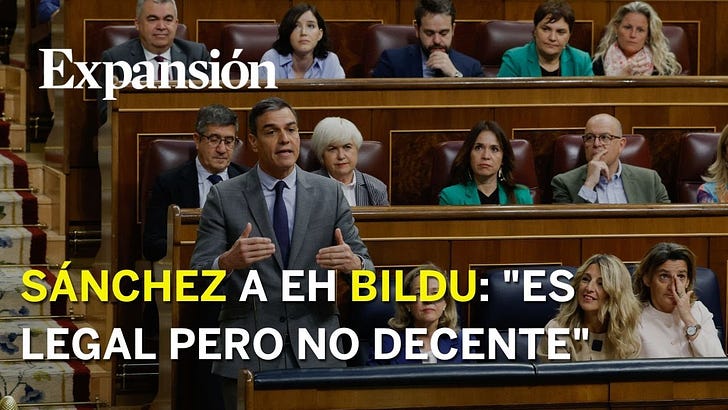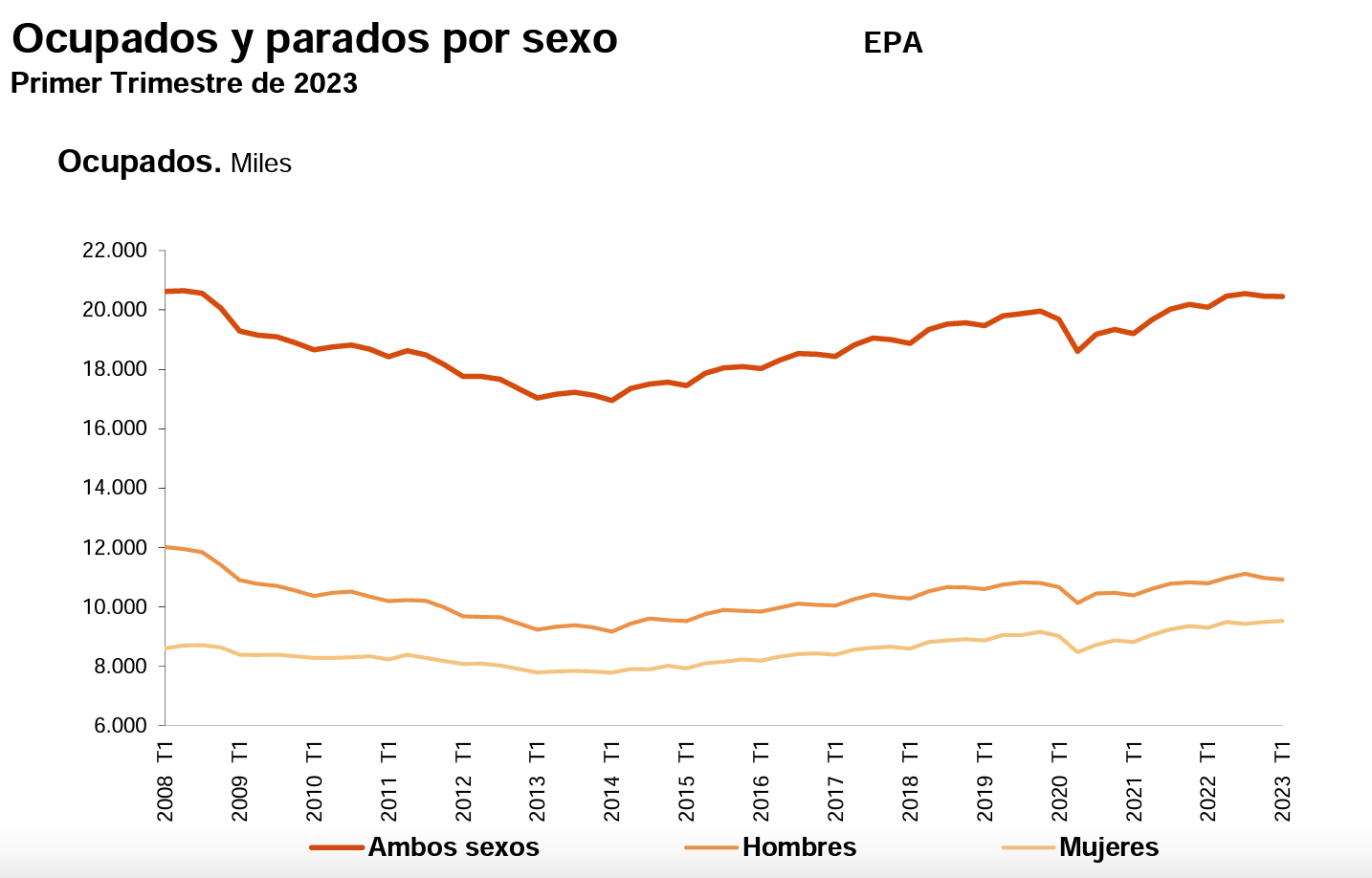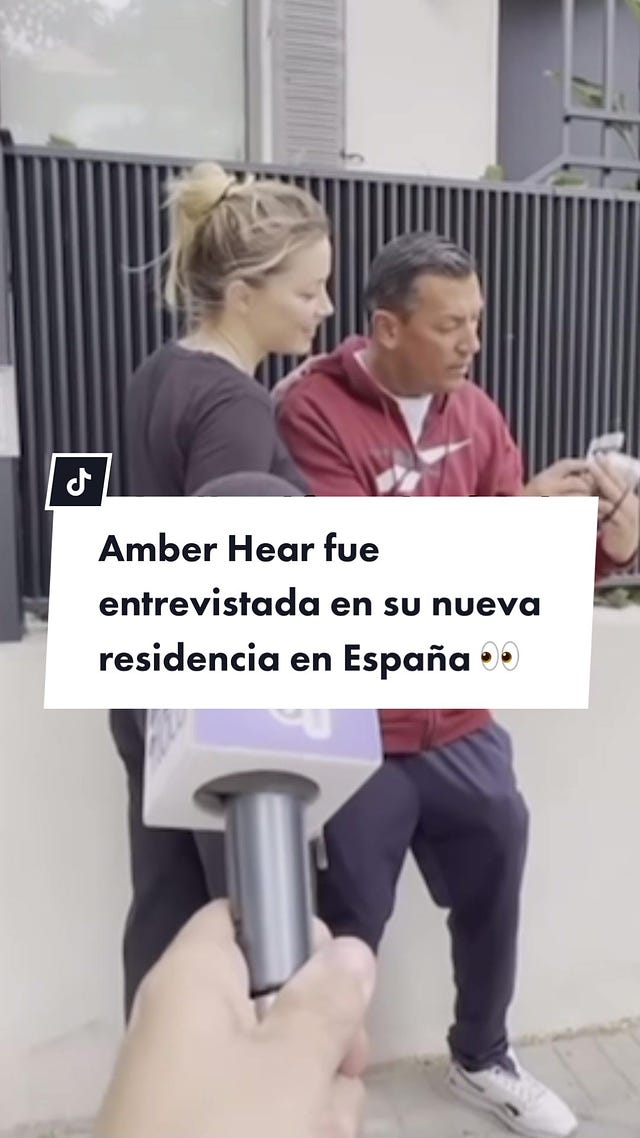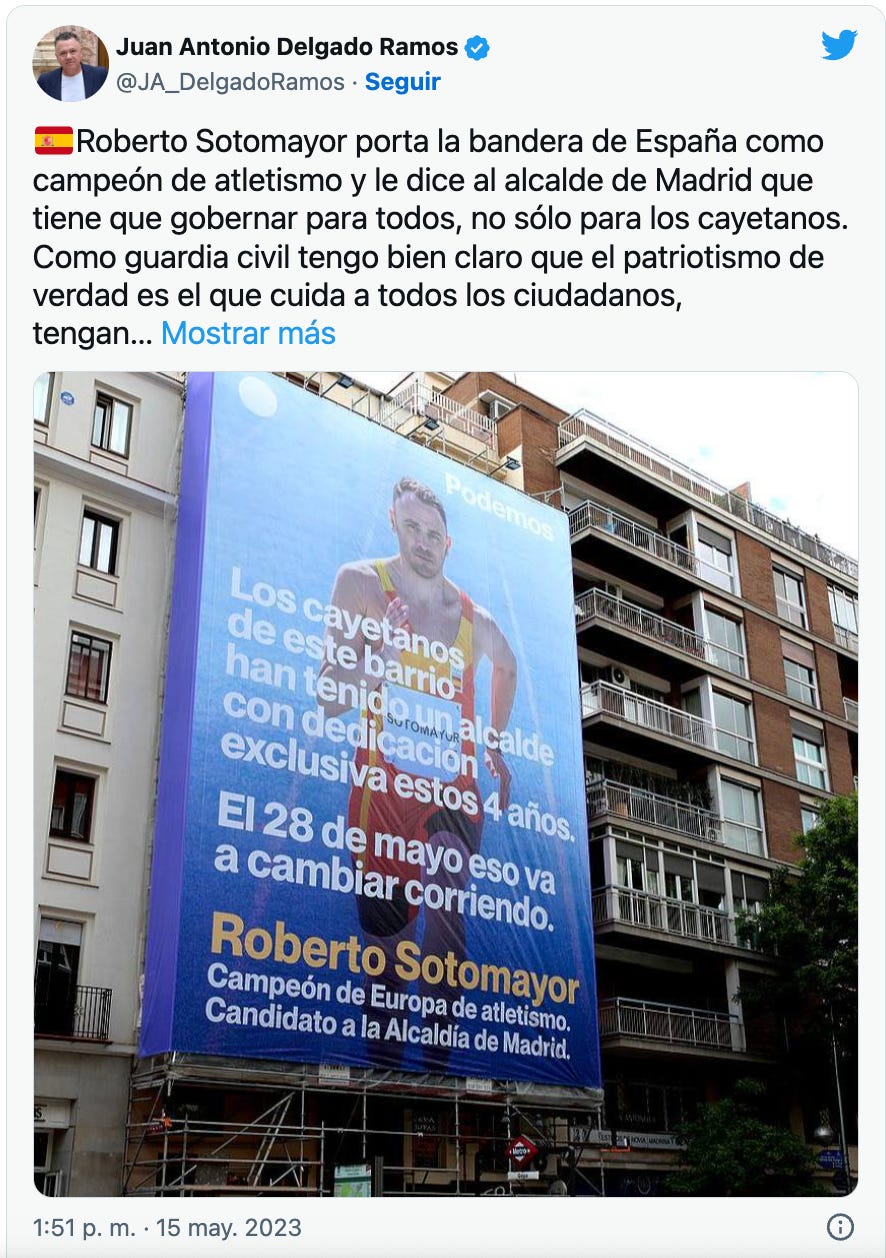🥊 This Week in Spain: And Then There Were 37
Also: Doxxing celebrities and those weird political banners.
By @IanMount and @AdrianBono | May 18, 2023 | Madrid | Issue #14
🎉 Welcome to The Tapa, an English-language, weekly newsletter about all things Spain!
🥜 This Week in a Nutshell: ETA terrorism is once again being debated only days before the election thanks to Bildu. Because the more things change, the more things stay the same.
🕺If you haven’t subscribed yet, please do so by clicking on the button below.
🫶 And if you already have, please send this newsletter around to your friends and family and help us keep growing.
The gloves have come off
🤬 ‘Legal, But Not Decent’
The decision by EH Bildu, a left-wing, Basque nationalist/separatist party, to run 44 convicted members and associates of the ETA terrorist group—including seven convicted for murder—in the May 28 (28M) elections did not sit well with, well, anyone.
And it seriously hotted up the 28M campaign. EH Bildu has supported the razor-thin majority coalition led by socialist Prime Minister Pedro Sánchez, and received backing for things it wanted in return, so Sánchez’s right-wing opposition in the PP and Vox (and some politicians in his own party) immediately slammed Bildu and the PSOE leader.
PP boss Alberto Núñez Feijóo said, "Sánchez is a captive president of Bildu and is dragging down the entire nation,” while Madrid regional president Isabel Díaz Ayuso and Vox leaders called for Bildu to be banned.
Even Sánchez’s Interior Minister, Fernando Grande-Marlaska, said that including the ETA members caused “unjustified harm to the victims of terrorism”, while the PSOE President of Aragón, Javier Lambán, called for “breaking off any relationship with Bildu.”
Heading back through the ETA history tunnel: Ostensibly set up to fight for an independent Basque country, ETA’s terrorists killed 829 people, according to a 2009 Spanish government document, including 486 members of the police and armed forces, and 343 civilians.
The dead included everyone from Luis Carrero Blanco, the expected heir to Franco who was killed in a 1973 car-bombing in Madrid (the explosion was so large it sent his car several floors in the air and into the courtyard of the monastery next door), to the 21 people, including a pregnant woman and two children, who were killed in the 1987 Hipercor supermarket bombing in Barcelona.
This brutal history has long made running ETA candidates unthinkable, for obvious reasons. In fact, in 2003 Spain’s Supreme Court banned the Batasuna political party for being a “complement” of ETA, and to stop it amplifying and justifying the terrorist group’s attacks. Several years later, the EU’s human rights court upheld the decision.
So what then hell were they thinking? That’s the tricky bit. EH Bildu leader Arnaldo Otegi was a local MP and spokesperson for Batasuna—and an ETA member who was convicted of participating in the 1979 kidnapping of the director of the Michelín plant in Vitoria, Luis Abaitua (and suspected of participating in three others).
The backlash against Bildu—and the PSOE—from ETA victims and the opposition was swift and tough. Speaking from Washington, where he met with President Joe Biden, Sánchez himself weighed in to control the damage, calling the inclusion of the ETA candidates “legal but not decent”.
Behind the scenes, the PSOE expressed its, um, displeasure to Bildu, and leaned on the Basque party to do something to take off the heat. But the PSOE can’t afford to totally break ties with Bildu—as it will likely need the party’s support if it has any chance to stay in power after national elections later this year.
The other big problem for the PSOE—beyond Bildu’s gambit being a terrible look and morally dodgy—was that the move played into the PP’s desire to make the campaign about the PSOE’s suitability and choice of allies and made it much harder for the socialists to emphasize their achievements over the last few years, from new labor laws to the recovery from the pandemic.
The pushback worked—to a point. The seven EH Bildu candidates who had been convicted of being involved in murders announced they would not take up seats if elected, a move that calmed the waters—to a point—but also sent the opposition pushing for more (along the line of Feijóo’s “7 down, 37 to go”). For her part, the PSOE’s spokeswoman, Territorial Policy Minister Isabel Rodríguez, acknowledged that the 37 left were still a problem: “There are still many steps to take,” she said. You can almost hear her sigh.
Sánchez’s two face-to-face debates with the opposition since the Bildu incident devolved into pissing matches where Feijóo said Sánchez was “more generous with the hangman than the victims” and noted he had vowed multiple times in the past to never make deals with Bildu, and Sánchez responding that the PP was living in the past and when it had nothing to offer it just said “ETA, ETA, ETA.” Inspiring stuff! (Not.)
Ultimately, while the distraction could offer the PP a national poll bump among those who don’t totally trust Sánchez’s PSOE, it is unlikely to lead to a massive vote swing in regional and municipal elections where, as the phrase goes, “All politics is local.” And it won’t lead to the banning of EH Bildu: ETA ceased its terrorist activities 12 years ago and has since disbanded, and even victims groups call the party “legal.”
🔔 A Message From Our Sponsor
Bucólico Café is a project of connection that was born as a specialty coffee shop.
We value time and understand that it represents both a cycle and an instant—chronology and nostalgia. Bucólico is a space that connects one’s soul with the purity, lightness and beauty of the countryside—while being in the city. Via a cup of coffee, a piece of cake or a song…
Located on Calle de Barbieri 4 — a few blocks from Plaza Chueca — Bucólico reassures the soul with a feeling of home.
Follow Bucólico Café on Instagram.
💬 Five things to discuss at dinner parties this week:
1. ‘Forget it, Ana Rosa. It’s Chinatown.’
You probably already know who Ana Rosa Quintana is if you watch Spanish TV’s morning shows. And as we mentioned last week, the journalist and undisputed queen of morning television is set to take over the afternoons as well, as she prepares to fill the content void left by the cancellation of trash TV talk show Sálvame.
Never a stranger to controversy, Quintana was trending on social media early this week after making what was perceived by many to be a classist/racist comment against the Chinese community.
During the San Isidro festivities this weekend, Mayor José Luis Martínez-Almeida awarded the Madrid Medal of Honor to several celebrities and personalities. Quintana was among them, and as she went on stage to receive the medal celebrating her professional career, she started talking about how much she loves Madrid.
First it was the generic platitudes everyone uses. She said she was “happy and moved” to be there, adding that the fact that this was happening in the city where she was born “filled her with happiness.”
“Madrid is the land where thousands of Spaniards come to make a living. Madrid is all of Spain,” she said.
When describing her early childhood and humble beginnings, Quintana then decided to mention the neighborhood in Southern Madrid where she grew up. That’s when it went to hell.
“I grew up in Usera, a working-class neighborhood of hard-working people, before it became Chinatown,” she said. Her comment lit up Twitter like a phosphorus grenade, as thousands took to accuse her of racism and classism and of offending the Chinese community in Usera, the district with the highest concentration of Chinese citizens in all of Spain.
Quintana has been in hot water before, after making insensitive comments about the Black and Roma communities.
And this wasn’t even the first time Quintana made controversial comments about the Chinese community. Back in 2020, at the height of the COVID-19 pandemic, she accused Chinese people of “bringing us the virus”.
The outrage came from people who seemed to interpret her contrast between Usera as a neighborhood of working people and Usera as Chinatown as a dig against the Chinese population there. (It bears mentioning that calling Usera Chinatown is hard to call racist in itself—Madrid’s official tourism agency website literally promotes Usera as “Madrid’s Chinatown” and invites visitors to participate in the Chinese New Year festivities and try “the best Chinese food” in the city.)
Thousands of people have signed a petition on change.org to take her medal away for making a “racist, xenophobic” speech during the ceremony.
There’s even been a Twitter feud between Podemos’s mayoral candidate in Madrid Roberto Sotomayor and current deputy mayor Begoña Villacís (Ciudadanos). When Sotomayor said that, if elected, his first order would be to get that medal back, Villacís simply tweeted back: “You won’t take any City Hall medal back because you’re no one to do so.”
You thought Sálvame leaving our TVs would mean less drama? Think again.
2.🧑🏭 Job growth has a accent and a gender
You might have noticed that Spain has seen a job boom recently. At the end of the first quarter of 2023, the INE national statistics institute reported that there were 20.45m employed workers in Spain, up 368,000 from a year earlier and the highest first quarter number since 2008 when there was, you know, a housing bubble.
That job growth had a very specific makeup—and one that you might not have expected. Of the 368,000 new workers, 140,000 were foreign women (43.6% of the total) and 44,000 were women with double-nationality (which nationalized immigrants often have), El País reports.
If you add those numbers up, 55.6% of the new jobs created in the last year are held by women who have a non-Spanish passport. And then if you add in foreign men—another 22.5%—over 78% of the job-holders have a non-Spanish passport.
So, why so many? It’s not much of a surprise, really.
Spain’s population growth (as small as it is) has come through immigration. The population of Spanish passport holders has been stagnant for more than a decade, while the foreign population has grown regularly, save in the years right after the housing bubble, and now makes up about 12% of the population.
At the same time, many of the new jobs are in hospitality. In April, a month that admittedly was home to the hospitality boomlet that is Semana Santa, 52% of the new jobs were in hospitality. And, as Universidad Jaume I professor Vicente Castelló noted in a recent Cinco Días piece, these are generally the kind of low-paying positions that native job-seekers are less likely to accept in good economic times.
There are also specific reasons for a boom in foreign women workers right now. Hipólito Simón, an economics professor at the Universidad de Alicante, told El País that inflation often pushes people into the labor market when their partner’s salary can’t keep up. And Spain has taken in more than 150,000 Ukrainian immigrants since Russia’s invasion—64% of them women.
3.📸 Amber Heard’s been Madridoxxed
Amber Heard moved to Spain recently, first to Mallorca and then, several weeks ago, to Madrid, with her two-year-old daughter Oonagh Paige. The move was meant as an escape and restart a year after she lost the bitter defamation case filed by ex-husband Johnny Depp. “She’s bilingual in Spanish and is happy there, raising her daughter away from all the noise,” a friend of Heard’s told the Daily Mail Online.
Some of the noise is back, however. Journos and fans have tracked her down to a house in the El Viso neighborhood (where Ava Gardner and Juan Domingo Perón were once unhappy neighbors—she hated the way he practiced his future Casa Rosada speeches from the balcony, he hated her parties).
The El Viso house is apparently 253m2 big, cost north of €1.5m, and was totally renovated by Heard. Since it’s been located, a herd of journos and fans have staked out the door to ask for autographs and report on her Stars—They're Just Like Us! activities (she receives her own Amazon packages!). She even gave a short interview to one.
Heard has been seen (and photographed) running in Retiro Park and visiting the Museo Sorolla. Through it all, she seems to have handled the—let’s be honest—sort of invasive coverage with grace, signing autographs and taking selfies with fans with a smile. She does indeed speak fluent Spanish, which she is said to have learned growing up in Texas.
The press coverage eventually got too intense for Heard, however. She reportedly called the Policía Nacional, who in turn told the reporters to give Heard some space and not film the interior of the house.
4.🦠 Now, about those campaign banners…
With the elections 10 days away, candidates in Madrid are ready to try anything that will a) get them some more votes and b) get them more followers. And since center-right candidate and Madrid community president Isabel Díaz Ayuso (PP) is marching towards election with a smile on her face (polls suggest she’s really close to getting an absolute majority), the other candidates are, well, sorta desperate for attention.
And so…early this week some unusual campaign banners appeared around Madrid with the very objective (hope springs eternal!) of going viral on social media, courtesy of far-left Podemos and center-left Más Madrid.
Podemos’s banner (see photo above) features their mayoral candidate, former athlete Roberto Sotomayor, and aggressively targets (not in a positive way) the residents in the upscale Madrid neighborhood of Salamanca:
“This neighborhood’s cayetanos have had a mayor who, for four years, has been dedicated exclusively to them. On May 28, that will change quickly”.
“Cayetano” is a pejorative term used to describe posh people (like those living in Salamanca). The term comes from the fact that a lot of them are, indeed, named “Cayetano”. And it was popularized a few years ago by rock band Carolina Durante, which penned a song whose lyrics explain what you need to own, how you need to dress and how you need to speak in order to sound like them.
Podemos has historically been critical of Spain’s one percenters, so it’s no surprise that it’s attacking them and PP mayor Martínez-Almeida directly. The far-left party’s leaders have repeatedly attacked him and accused him of having a style of governing that only benefits a few.
People on Twitter (where else) have been divided over the message. In fact, another left-leaning candidate for mayor (and no fan of Almeida), Recupera Madrid’s Luis Cueto, has criticized Sotomayor’s strategy to insult his potential voters.
The second, ahem, “unusual” banner comes from center-left Más Madrid and indirectly attacks Díaz Ayuso. The message is based on something Ayuso’s opponent Mónica García has said and it simply reads “Madrid is the shit”.
OK, fair. Translating “es la hostia” as “is the shit” may not be entirely accurate. It’s more like “Madrid is great” except… really great. Like, “Is the bomb!” (Literally, it’s “Is the communion wafer”, but anyway…)
The quote comes directly from García, who criticized Díaz Ayuso for her political ambitions and for sometimes sounding like she’s running for Prime Minister rather than President of the Madrid community. “Madrid is great,” García said in an official party statement, adding: “Whoever wants to run to be in the Moncloa Palace should go to the Moncloa Palace”.
5.🫠 Hear the one about the Vox Councilwoman selling cocaine?
Whoops! Considering how far-right Vox is supposed to be the party of law and order, this is definitely not good for the brand.
This week we found out that Ana González Martínez, a councilwoman at the Parla City Hall, in the Madrid community was, according to police, moonlighting as a cocaine dealer.
González Martínez, who was third on the candidates list this election, was arrested on Thursday by the National Police in a bust that was conducted in Southern Madrid and several towns in the Toledo region where she owned property.
Police say that during the raid they found over one kilo of cocaine, significant amounts of marijuana, short and long range weapons, cash and high end vehicles.
To make matters more awkward, González Martínez starred in a video with Rocío Monasterio, Vox’s presidential contender in the Madrid community, denouncing the squatter problem in her district and saying that they were bringing “crime and drugs”.
According to local media, the councilwoman is being charged with drug trafficking, money laundering and electricity theft (police says she also had a significant marijuana plantation and was stealing electricity for the indoor cultivation of cannabis).
González Martínez has announced she has dropped out of the race after the leading Vox candidate in the Parla City Hall asker her to do so.
A statement released by Vox in the Madrid community said that “after information published in various media outlets, VOX once again reiterates its commitment to its citizens and, given the legal situation the current councilwoman is involved in, has asked her to tender her resignation, to which miss Ana González voluntarily agreed.”
González Martínez is currently under arrest along with her husband—who is in the military.
And it gets better! In a report by El País, a person who was allegedly close to González Martínez claims she was nicknamed “the nazi”. “She was polite but very radical. She was against immigrants, against social programs…against everything.”
She must be fun at parties. 🥳
🙏 Before you go, please remember to share this newsletter with your friends on social media. The more we grow, the more information we’ll be able to offer each week.
We’ll be back next week with more.










